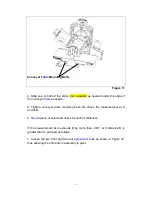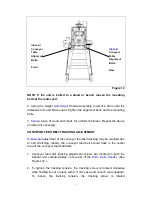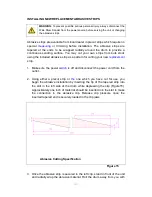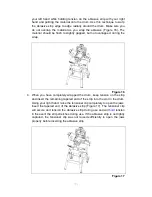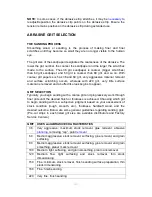
7
can be removed in a single pass.
DRUM SANDING ADVANTAGES
One advantage of the wide drum sander is that you can work with material up
to 405mm wide with this unit because of its open side design. Although you
still abrasive sand
with
the grain, you do not have to read the grain to prevent
tear-out. This is especially important with thin stock and material with
convoluted or mixed grain directions, like bulr, crotch, and tiger patterns.
Drum sanders exert much less pressure on stock than a thickness planer,
giving you the capability of working with very thin material. You have the ability
to sand to veneer thickness if desired, expanding your woodworking horizons.
You can also sand smaller length wood, odd-shaped pieces, and end-grain.
REMOVING LUMBER CUP
The ideal machine for removing cup from
lumber
is a jointer. However,
because of the minimal pressure exerted by the drum sander, it is possible to
remove cup, since the lumber is not compressed flat on feed belt and table.
Be patient, this process can take quite a while
depending
on cup depth. Feed
the stock into the machine cup crown up (edges resting on feed belt) and use
a coarse grit abrasive. Repeat until the crown is flat. With one face now flat,
flip the board over and sand it flat. Do not be shocked by how thin the board
may become after all cup has been removed.
Board, which is warp or twist, will not be remedied by a drum sander or a
planer. Always inspect your lumber for warp and twist before drum sanding
since it is prone
to
hanging-up in the machine, shorter length lumber in this
condition is especially troublesome.
PLAN YOUR WORK IN ADVANCE
Planning your drum sanding operations in advance will minimize setups, work
time, and frustration level. Group material to be sanded by thickness and grit
requirements and work through each required sanding grit starting with the
thickest material through the thinnest, then change over to next finer grit and
begin the process again.
We suggest that you experiment with the
various
sanding grits and wood
species to determine the results you can expect before ruining project material.
With new set-ups, always test with scrap lumber before sanding your project
material.
Summary of Contents for MM3126
Page 31: ...30 DIAGRAM 1 ...
Page 32: ...31 DIAGRAM 2 ...

















